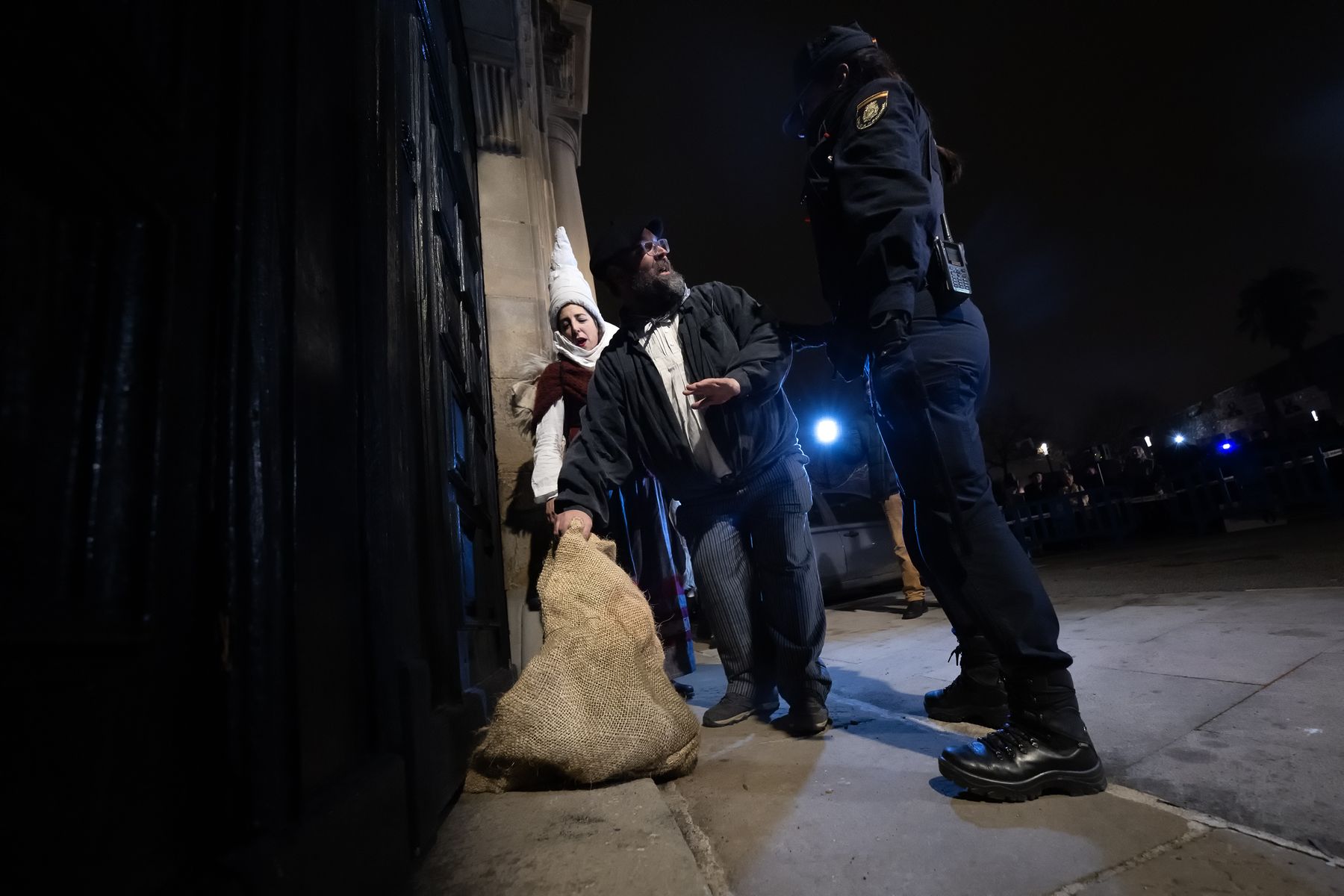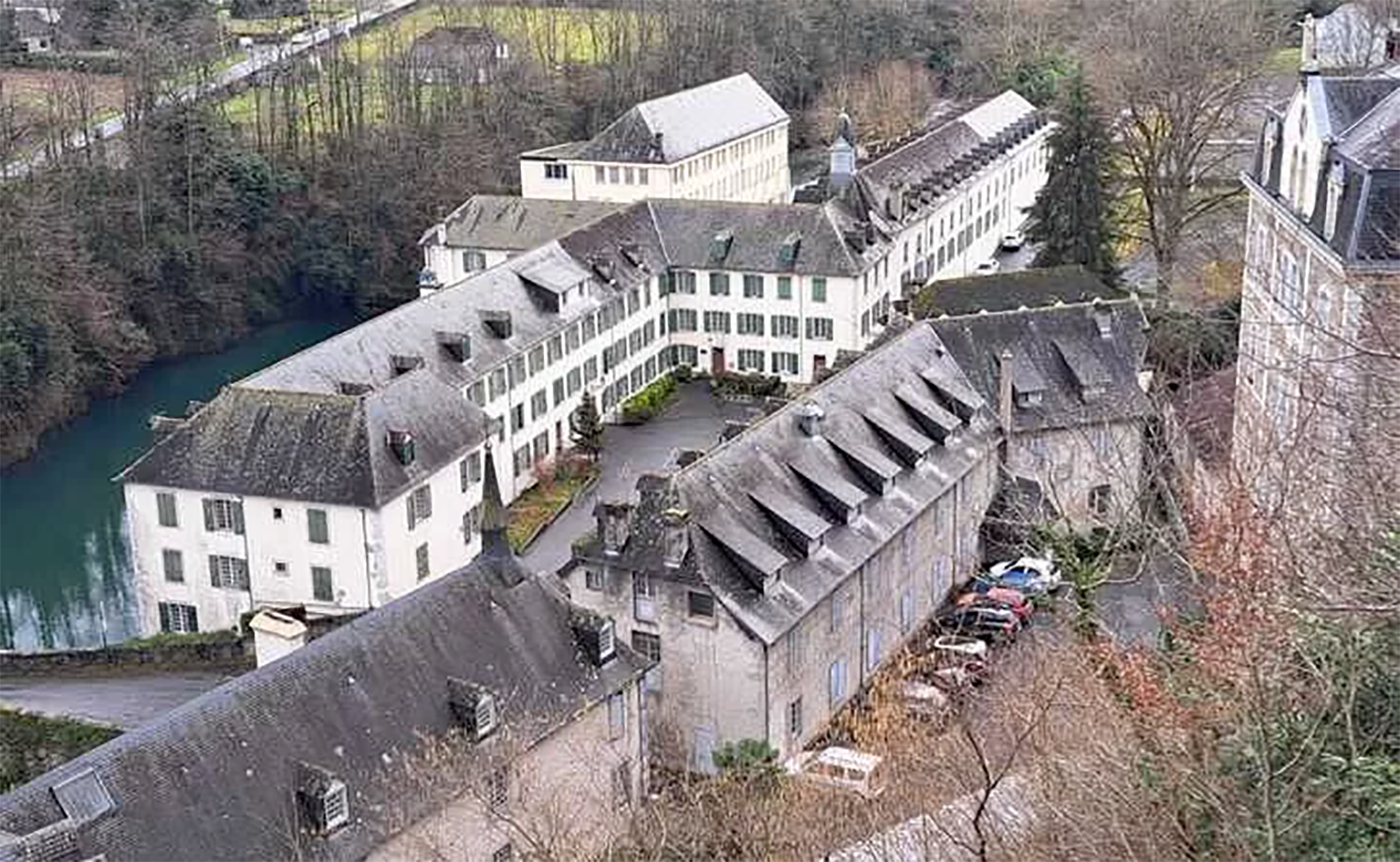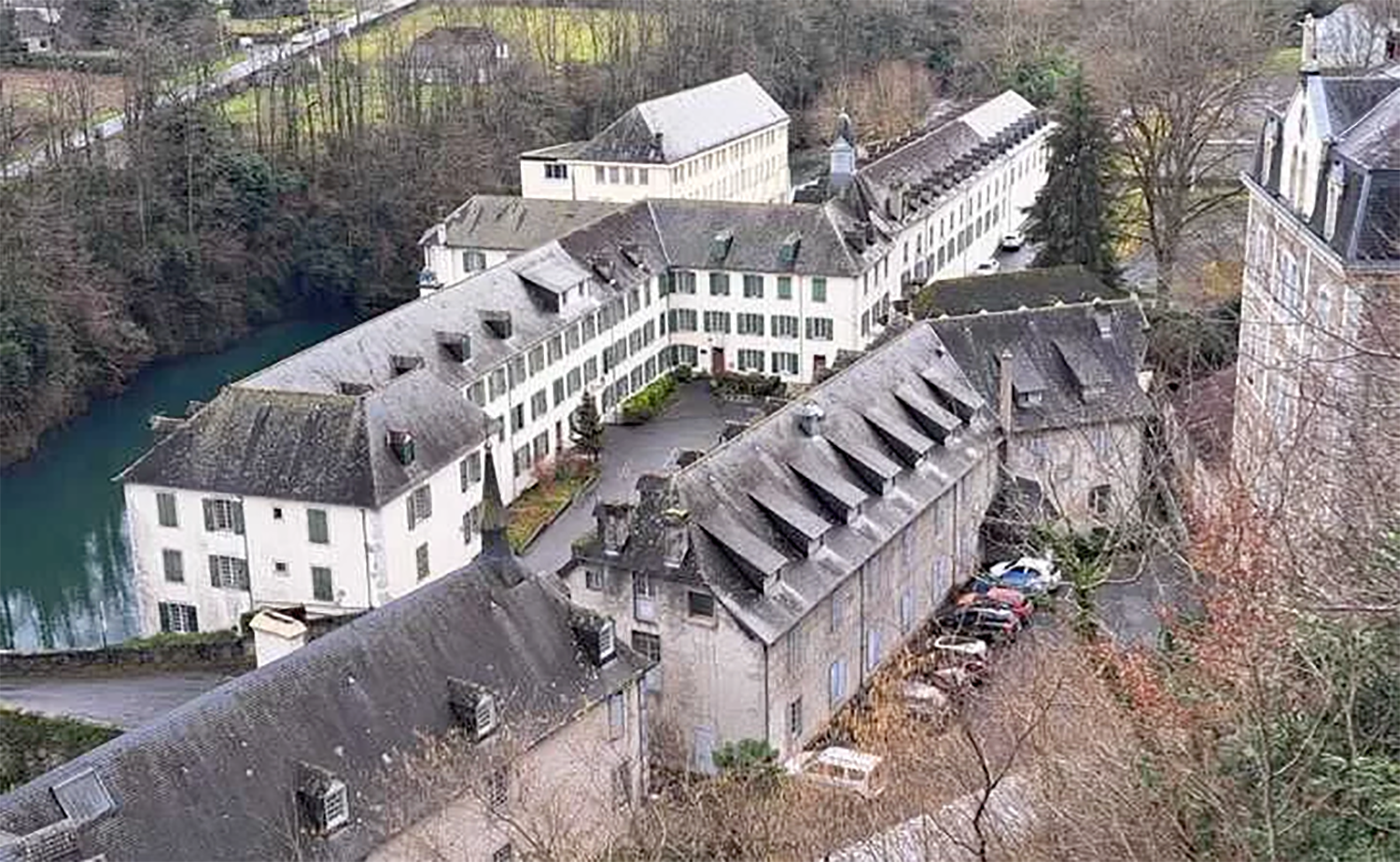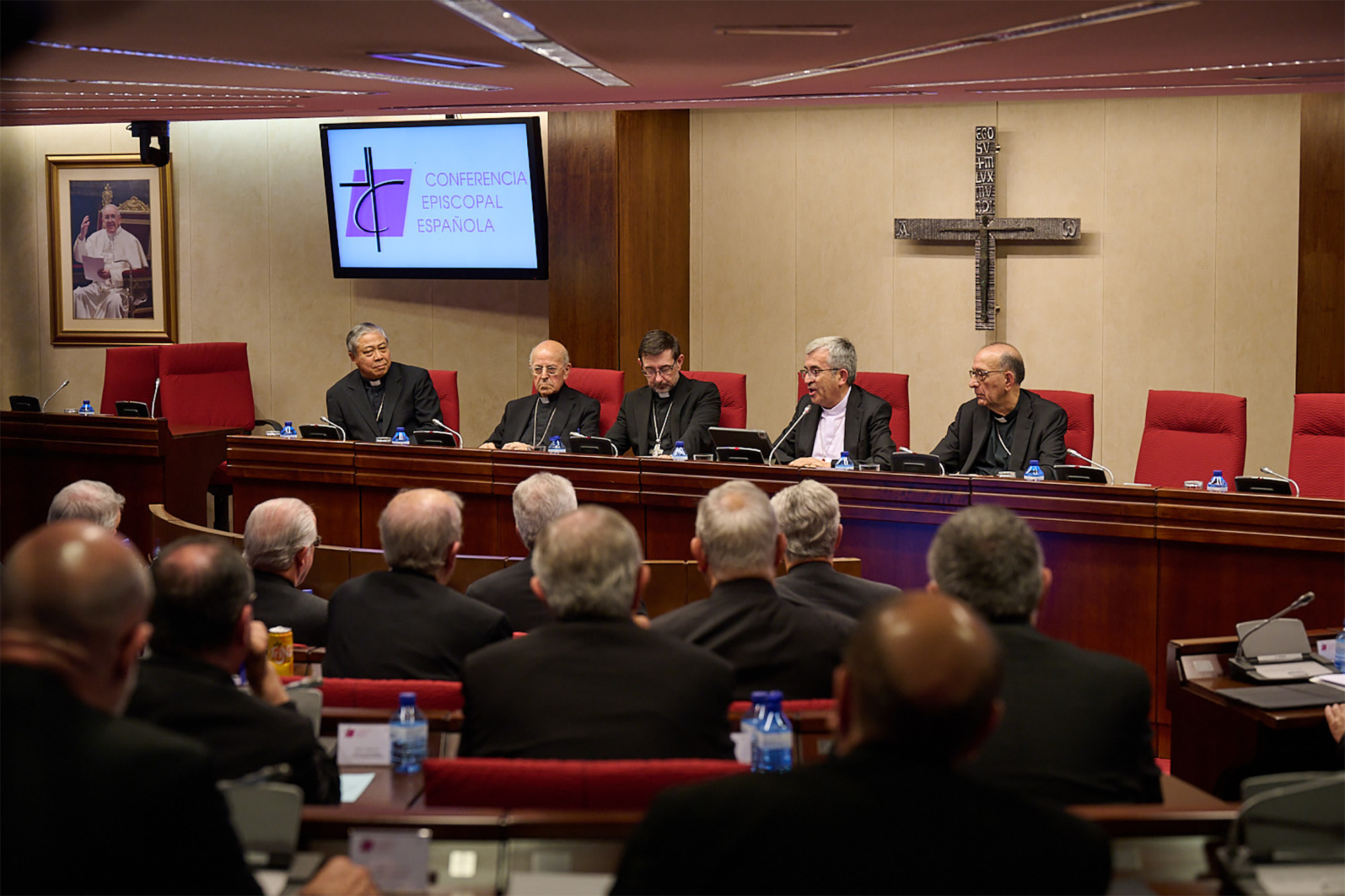"My life has been fighting, because they're injustices everywhere."
- He has always liked the scrutiny and, in so doing, he wanted to tell it both, to give society the words of the people who accompanied him. Jenofa Berhokoirigoin gave us some news from Etchebarne at ARGIA in 2017, but last year he published it from Aldui to the World and we read it horrors, we left it in an unavoidable place.
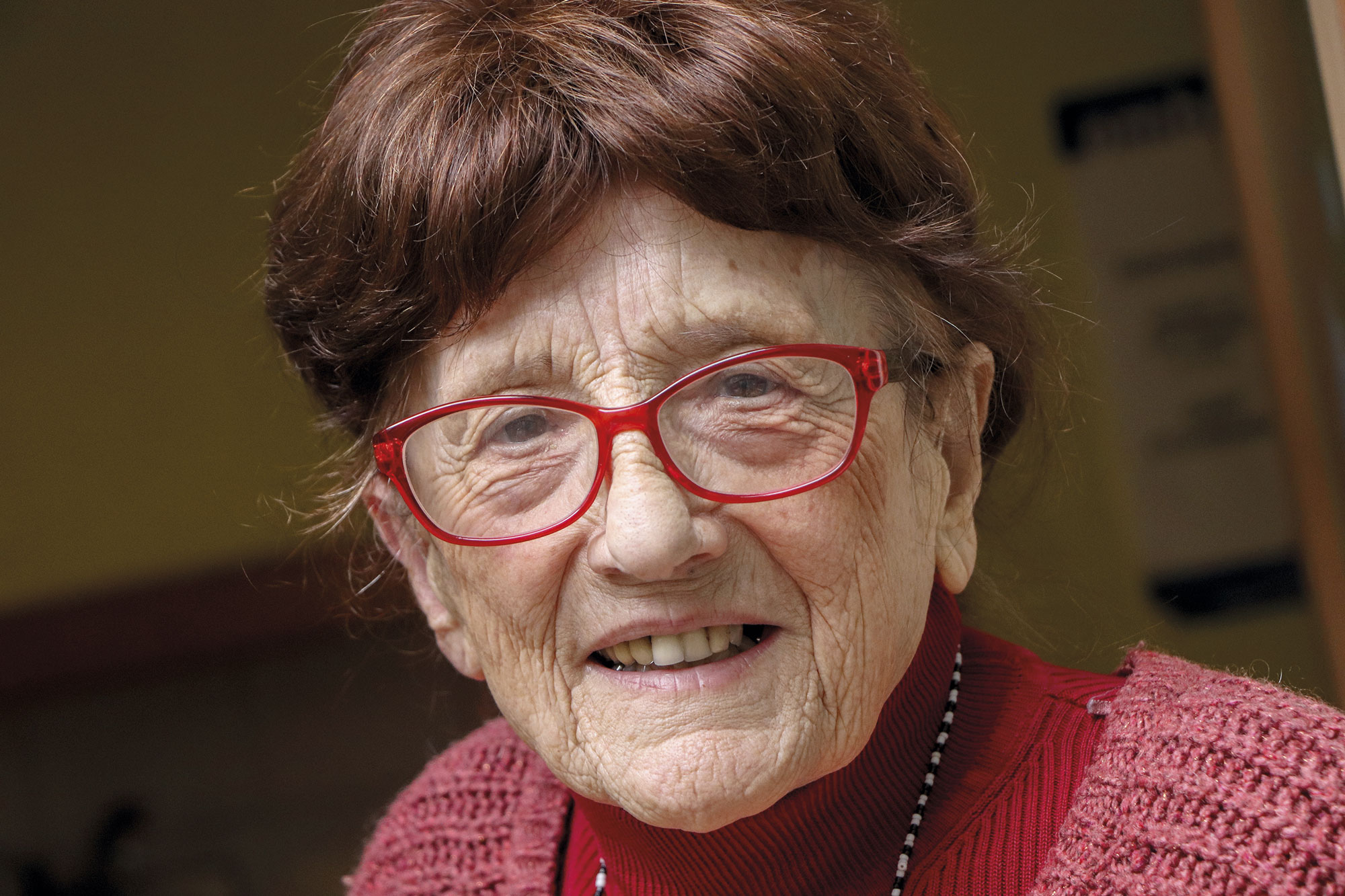
Gaby Etchebarne Urrutia Aldude, 1932
After studying in the village, she continued studying in Uztaritz, in the daughters of the Cross, before going to missionary serora, to the convent of La Motte, in Muret, Occitania. Black years for Gaby. I was in Argentina in 1961, at the congregation school, with mentally disabled students. In 1971 he was sent to Laos, being a warrior in the country. In 1975 she stopped serora and settled in Tolosa (Occitania) and joined the labor and social struggle. He is the author of several books and last year published Aldudetik mundura (May), a dramatic play.
In his book Aldudetik Mundura
has collected many stories from a lot of history. One honey and one heartburn. At the time they did not have permission to dance… It was Alduque’s parties in manure, and there were always ball-parties, meals and dinners, and we were there, in everyone… but not dancing, because we were Mary’s children! We didn't have permission to dance. It was a ban and we suffered a lot from it. So we went to my father's village, Bazkazan. There was no dance! But nobody had to see us! One day, though, we danced in Bazkazan and a woman from Alduque went through there. He saw us dancing and told our sin in Aldude. Our parish priest knew that, but he did not listen, because the parish priest himself had suffered so much, he was imprisoned in Germany in a concentration camp. And so we are still children of Mary and dancing in both!
He says the pastor of Aldude was in prison in Germany. You saw the Germans in the village. You also have a story there. My father had a ttipi pickup truck and several times he was smuggling Baiona or Alduque from there and then Spain. The Germans were banned from smuggling, and I remember that one night there were up to ten young people in our house and that they had a package to get across. My sister André and I had our role in that matter. One moved
a hundred meters from house to left and the other to right to see if there was German on the dark night. There were some skin-fast strips that were heard from afar that were German. And so I heard her brush throw! I ran home, there were the Germans smoking. The young people took the burden and went up the hill behind our house. But then began the storm, the avellano and the lightning, and those boys we saw on the mountain! “They are lost! They will drag them!” But no. The Germans also got into a hostel and saw nothing!
In the interview that Jenofa Berhokoirigoin did to you we learned that she went to the serora. Nun, yes. I loved my tribe, but I didn't want that life, I wanted to be far from Alduque, meet new cultures. However, I didn't want to hurt my family, and then I chose: I entered the convent. And everybody's happy. I knew I would suffer for several years, but I would ultimately fulfill my wish. On the day of going to
Sero I left my house at 4:00 to catch the bus from Baigorri. From there to Baiona and then to Muret, in Occitania, next to Tolosa. I entered the bus and my parents there, crying in the eye, knew that they would not see my daughter again in this life, because I had chosen a missionary congregation and we were going to Asia or Latin America never again!
Before entering the Murete convent, he was in Ustaritz, a pensioner or an internal student. If in
Uztaritz the seroras called the daughters of the Cross, and one day they decided to ask for a house for three or four seroras in all typical villages. They helped the rector, they prepared the mass, they made the cache… and they were also our nurses. To go to the villages that made kilometers, sun, snow or rain! Yes, people wanted them. I remember a Basque serora, who did not spend a day without speaking against Franco. His family suffered a lot and had some brothers who were prisoners in Spain.
In Ustaritz in 1944 he was almost twelve years old. My father and mother told me that I had a
scholarship to go to Uztaritz Sero School, which would be a great help paying my pension, and I left. And what to live in that great house of Uztaritz! We didn't have permission to talk to each other, except in recovery time! Every month we took a shower, our meals and dinners weren't rich, all Saturday went to the top to school to listen to our notes, and if they weren't good at making reproaches to everyone. We were immobilized! So I spent six years there, normally tangled up, with my three sisters. And I've seen amazing things there!
What, Gaby? Our schoolchildren washed their clothes on the river. And from time to time we said, “A person
has fallen into the river and died!” But it was a suicide! So I didn't realize it! We lived in the convent sad, we were treated badly, the anchors weren't holding and they committed suicide by pulling us into the river. I didn't know they were suicides! My sister still says to me, “Didn’t you realize they were suicides?” And no, I didn't realize.
At the age of 18 he entered the serora at the convent of Murete. There too, life was very hard, as you have written. I would go into my room and cry with every trace. The cold were dead and hungry! I met the hunger in the convent. One day I got to see my
father and he said, "What are you doing here, Gaby? You will not come home!” I had 10 kilos lost! We got up at six o'clock in the morning, we couldn't clean the mink, because the water was covered! We went to some chapel and a half for mass and prayer. Then the coffee was served with milk, a squirrel of barley, and the milk was also cremated, because the cream had to be retained for the guests, and for the dog! & '97; I comfort myself, though, thinking that life would also end and know the riches of the world.
In the convent, again the history of the Germans. Our superior kept the Jews and members of the resistance in the convent. One day the SS
gathered for those. He said that our superiors could come in, but they had to see something before. He led them to see some kids ttip: they were children of German soldiers; mothers, French! Superyora welcomed a ttipi boy and handed him over to the German officer, as he said: “Made in Germany!” The soldiers started and left. We all have a curious mixture, with wickedness and benevolence, and the superyor also had: it held back people who fled in the convent, but with us it wasn't right.
Life inside the convent was, as you said before, bad. Sexual abuse is also frequent. What they've done for priests is awesome. With children, and with sero. I met Ainitz, wife and children, I told him. Women cannot speak. I realized it was serorous: we should obey men,
be servants of priests! What the priests have done, I'm going to tell you: in the last three years of the age, I went to the supero. We thought we had to make a revolution within the congregation and they told me that I had to be the superior par excellence. I set a condition, they accepted it, and it said yes.

“Bravo, bravo, stand here!” the bishop told me. I stood there and realized I was coming by my side, increasingly. When he came next to me, I said, "Stop!"
And she was superior. And one
year I went to all the communities of the world, to the top. Madagascar, Hong Kong, India, Vietnam, Latin America -- I told the Seroras that we had to live poor, work like people, live from work. We went to a place and talked to people like the bishop. One day I went to Hong Kong and there I spoke to the bishop. It was a big room and had a canapé: “Chauri, bravo, stand here!” he said. I stood there and realized I was coming by my side, increasingly. I came by my side, and I said, "Stop!"
And? The bishop became very red. It wasn't another one. But the force of not saying was not a young serora, it was raped! Could have been raped by the bishop! They say that the bishops of Lourdes
did things like eleven. I say that they are more than eleven. I don't have any tests, but I know the priests did ugly things, with boys, and sero! They told me. Now they say that they have found the bones of the children on the convents' lands, the priests make the seroras children! Case Ireland. In 2017, bones of
800 children were found in an Irish convent…
I know a lot of things, told by women. I have a friend, man, who says, "Gaby, you don't have to count everything, it's not worth it." That man can say what he wants. No, wives no? It's amazing! Now there are several women starting to tell things, but I, when I wanted to tell them about it, was told no. I am a collegiate! Seror wrote a few things about how we treat ourselves, and I've sent a friend who doesn't: "Gaby, what you've written is terrible, but I think nobody's going to publish it." Wives have to squeeze their mouths and silence in France too! And eni, of course, "Listen, Gaby, you don't have to talk much." And the woman always in silence!
Horrors inside the convent and horrors outside it: Argentina. I was told one day that I had to go to the superyor. I wasn't quiet! And she said, "Gabrielle on
her knees!" And then: “The bishop of Morón, in Argentina, needs a serora to renew the cachimi and to schooling deficient children. You will go next year, but before you have to follow a special pedagogy in Paris for a year.” I was delighted from the superyor chamber! And so I went to Paris, and then Morón, 25 kilometers from Buenos Aires. Eight years ago in La Mott [Muret].
1961, therefore. So Argentina had the military government, and then it did. Makurrena, by General Jorge Videla. Over 30,000 people disappeared, men
and women, children and young people. They had terrifying prisoners, the prisoners were tortured… I mean the police and army teachers were French military, many apprentices of the Algerian warrior! In 1978 my two friends were imprisoned, tortured and killed: Cathy [Domon] and Leonie [Duquet]. I then lived in Tolosa [Occitania]. I cannot forget that. One day in the morning, in the morning, he had a phone call: “Cathy and Leonie have disappeared. We don’t know where they are.”
The missing Cathy and Leonie forever. Cathy was expelled from
a small town. Your name was the people! He worked with the peones there, he struggled, but his boss set up an army man to better care for the peones, and told the peones that they couldn't talk to Cathy, that otherwise they would be tortured. This is how Cathy arrived in Buenos Aires, with great sorrow. He met the Mothers of the Plaza de Mayo and attended all their meetings, particularly in the church of Santa Cruz. There they welcomed Cathy with ten other females, put them in the famous Falcon cars and took them to ESMA prison.
His two friends were arrested in 1978, as he says. Cathy was received on
8 December 1978. Leonie, two days later. Some witnesses know that for about ten days they were tortured in ESMA and then, days later, they were thrown to the sea from an airplane… Cathy stayed forever at the bottom of the sea, but on a beach where the body of Leonie was captured and the sea came back to shore. It has a typical burial in the garden of the church of Santa Cruz, next to several Mothers of the Plaza de Mayo. When my two friends were killed, I wanted to go to Argentina and talk to Videla.
Reaching out to the dictators is not easy… But we already knew Videla! I had a trisomic
kid and I was in our school. So we've met Videla. When we knew that Cathy and Leonie were dead, we pulled out the big worm, we wanted to go there. I did my passport two days, I went with an attorney we needed, but Argentina didn't give us permission, it didn't let us go.

"What they've done for priests is awesome. With children, and with sero. I've met Ainitz, wife and children, I've told him."
In Argentina, dictatorship. Then, when you were in Laos, war. We belonged to foreign missions, to the women's department. The bishop of Laos, of Ezpeleta, of Urkia, asked the people and sent us there. There was gerla, yes, bombs, refugees… We were going to search for people, to give shelter… It was the first time we saw guerrillas, we were curious, we weren’t conscious, we weren’t terrible. We were young and crazy!
Once, though, she stopped being
a serora, she began to make civilian life in 1975. It was a liberation! I remember that morning I woke up and thought, "Free, in the end free!" I had nothing but a ttipi suitcase, but I was happy. I started living in the Bagatelle cartel, where it's an Arab anchor. I soon made friends, but I didn't see the work easily. Then yes, I worked in a hotel and elsewhere, until I entered portraits and always fighting. That has been my life, the struggle always, because everywhere they are injustices. And I fought in Yugoslavia, in Palestine, in Paris… We believed that with the struggle we would get a lot, we fought for everything, but nothing has changed.
In March you will be
91 years old, you have also reflected on aging… Aging is the most difficult time to live. First of all, it's not worth complaining, because people don't want it to be a bit of a complaint. “You are a cat and leave us alone!” as it is said. You don't need to be equated, you always need to be a goodness. There is no remedy to spend. There is always pain, or in the gut, in the heart, or in the legs… If it is always pain, the body is worn out. I have rebuked two new texts, one of convent life, the other is waste. I wanted to scrutinize them before I died, and I think they'll be published later this year...
* * * * * * *
Library
“The girls didn’t have the boys’ freedom. Everything was changed for two reasons. First they opened the library in Aldude. We suffered a lot from not having books, because we loved reading. Otoi, give the children the ability to read!… The second reason was to open a movie theater. We could go every Sunday, after the laughter of the day before! Cinema was like our miracle.”
Superior
“In Murete our superior was a rich Argentine wife. There, during the winter, she headed with her husband to the Côte d'Azur (France). Man loved the casino and lost his property one day. He hanged himself! The widow decided to enter a convent, but she could not support the life of the convent. He met a missionary who told him that he wanted to create a congregation to go to India to live with the poor. His wife told the missionary that he was acort and they gave him a great house in Murete. There I entered in 1953.”
LAST WORD
Anguish
“Now, sometimes I wake up at night… I’m sorry ‘Mudo, mudo’, but no, nothing! Sometimes there is distress, like when I heard that Cathy and Leonie were killed.”
Paris 1845. The Labortan economist and politician Frédéric Bastiat (1801-1850) wrote the satire Pétition des fabricants de chandelles (The Request of the Sailing). Fiercely opposed to protectionism, he ironistically stated that the sailing boats asked for protection against... [+]
Auzoan Bizi Etxebizitza Sareak salatu du Berakah programa beste bi familia etxegabetzen saiatzen ari dela, iaz beste familia batekin egin zuen bezala. Dagoeneko salatutako hauetaz gain, Berakahko kasu gehiago ari dira heltzen etxebizitza sarera. Berakah programa Santa... [+]











